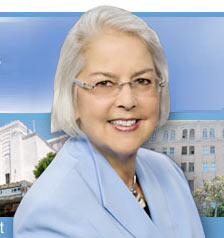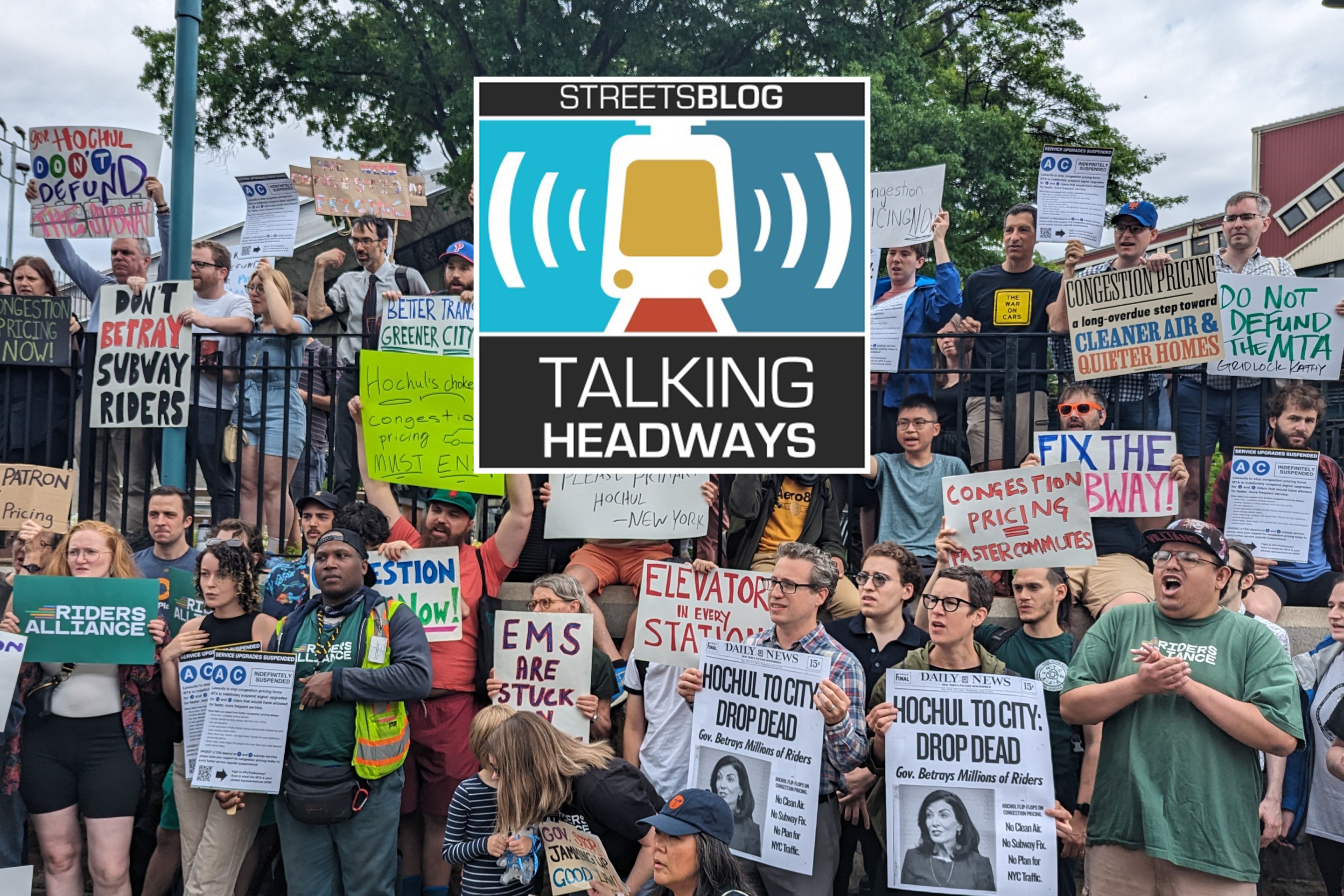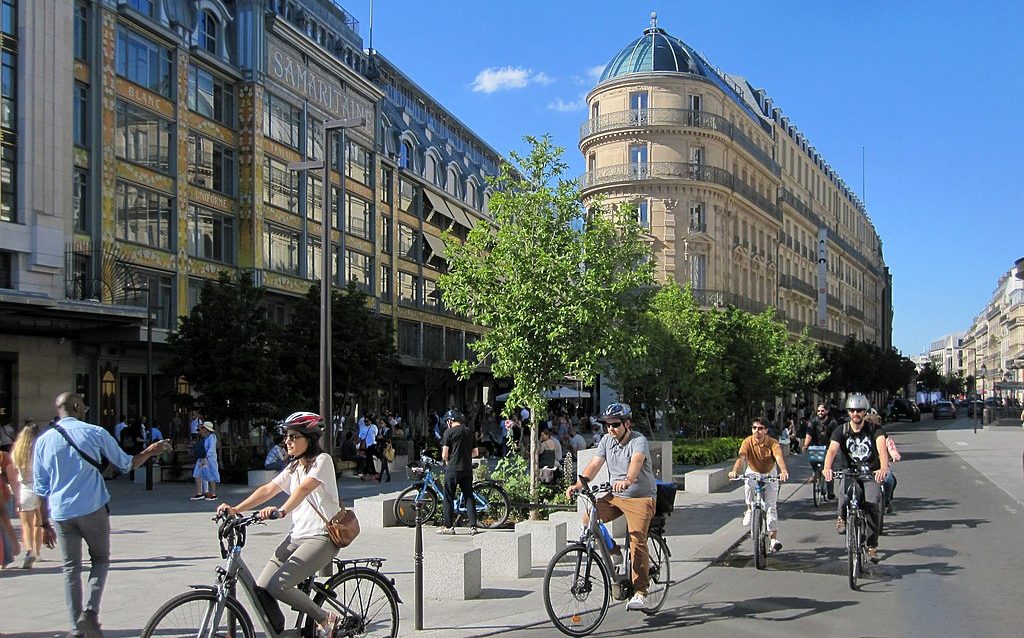On Thursday, U.S. DOT announced the 47 people who will make up the new Freight Advisory Committee, tasked with coming up with a cohesive, strategic vision around freight movement in the United States. Freight crosses state lines and travels on every mode imaginable, but there is no national agency to coordinate all this movement of goods, resulting in a chaotic and fragmented approach divided among several decision-making bodies. With any luck, the new advisory committee will attach some smart national priorities to freight movement and set policy accordingly.

If controlled by the existing modal agencies within U.S. DOT, the conversation about freight can too easily work backwards: deciding first that the solution is highways, for example, and then figuring out how to match that with the problem. Shipping freight by rail and inland waterways can often be a far more efficient and less polluting way to move goods, while taking trucks off congested roadways.
The committee will also have to avoid the pitfalls that come with the expansion of the Panama Canal and the supposed freight “tsunami” that is going to come crashing down on U.S. shores. While all of the country’s west coast ports can already handle bigger ships, many east coast ports are in panic mode, worried that they either need to spend millions on dredging or get left behind. If these decisions are left to the states, there will be a lot of unnecessary spending. But if decisions can be made with national priorities in mind, the country can decide which – if any – east coast ports need to be deepened and save the money on the rest. With any luck, the people named to the U.S. DOT freight advisory committee will be dispassionate enough to make those calls.
And there's good reason to think they'll make smart calls. The committee includes many advocates for multimodalism and livability. “[It’s] nice to see some solid academics and advocates in here, that states are represented by more than just DOTs, and that cities are so strongly represented,” said Deron Lovaas of NRDC. “This stacks the group strongly in favor of robust debate and balanced recommendations. I hope their deliberations capitalize on this good setup.”
Joshua Schank of the Eno Center for Transportation agreed that it is a “very impressive group,” while adding that it is “a bit heavy on existing stakeholders” -- shipping companies and trade groups who represent the freight industry. He said that while “real change demands an outside, more objective presence from groups that do not stand to benefit from DOT decisions,” stakeholder buy-in is necessary to “move the ball.”
To pull out a few of the brightest stars:
Indianapolis Mayor Greg Ballard was an unexpected favorite at this year’s National Bike Summit. A Republican, Ballard created the city’s first Office of Sustainability ever and is working to bring bike-share to the city. He’s not the only person representing cities on this panel: Philadelphia Mayor Michael Nutter, Memphis Mayor A.C. Wharton, and Stacey Hodge from NYCDOT all bring an urban perspective. Anyone else putting together a big panel on freight might load it full of state DOT heads, but U.S. DOT only named two: Ann Schneider of Illinois DOT and Mike Tooley from Montana.
Anne Canby’s transportation résumé is too long to do justice in a small space. To summarize: she headed Delaware’s DOT in the 90s, and she also boasts high-ranking stints at NJDOT, the Massachusetts Bay Transportation Authority, and U. S. DOT. She currently serves as president of the Surface Transportation Policy Partnership and director of the OneRail coalition, which works to improve both freight and passenger rail – interests which sometimes seem to be at odds. She’s one of the only people representing passenger rail – at least in part – on the freight panel. (See below for the other one.) While it stands to reason that U.S. DOT would focus more on inviting freight experts than passenger advocates to a freight committee, it makes sense to have someone in the room who can wear both hats.
Kevin Brubaker also represents the interests of passengers. He manages the Midwest High-Speed Rail Network Project at the Environmental Law & Policy Center. “He’s a very smart, savvy and outspoken advocate,” said NRDC’s Deron Lovaas. “Kevin is one of those guys who is good to have in a meeting because the level of debate and discussion rises when he opens his mouth. He always adds value.”
José Holguín-Veras, an engineer at Rensselaer Polytechnic Institute, was recently honored by the White House as a “Champion of Change.” He researched the congestion-reduction potential of off-hours deliveries in New York and found that deliveries that take almost two hours in the middle of the day take half an hour in the middle of the night. “For the first time in my life I found an idea that’s politically convenient and economically sound,” he said, “but I aged 20 years” trying to convince receivers to switch. Despite the limited success of his pilot, Holguín-Veras has shown he thinks outside the box – a quality that will be useful on the freight panel.
California Assemblywoman Bonnie Lowenthal was recommended to U.S. DOT by NRDC and the Sierra Club because of her leadership on transportation in her state and her excellent record on environmental initiatives. Ironically, her ex-husband, State Senator Alan Lowenthal, is the primary opponent of high-speed rail in California. The Port of Long Beach -- one of the country's busiest -- is in her district, and she heads the Transportation Committee for the state. A former LA County MTA board member, Lowenthal understands transit, too.
Mort Downey, Clinton’s deputy secretary of transportation, was an obvious choice for this panel. He’s a great champion of multimodalism, always pushing for “transportation” bills to replace “highway” bills. He’s old enough to remember, with some bitterness, the broken promise that the interstates would bring shopping downtown – and then the reality that they shipped shopping out to the suburbs.
Joan Claybrook was president of Public Citizen for 26 years, but before that, she served as President Jimmy Carter’s NHTSA administrator. She’s a consumer advocate and a safety watchdog, having fought for the standard inclusion of airbags in automobiles and against the “profoundly anti-social and violent aspects of these pollution-belching highway battering rams” known as SUVs. Together with Jeffrey Burns of Parents Against Tired Truckers and Citizens for Reliable and Safe Highways, Claybrook will be reminding other panelists of the safety considerations inherent in things like bigger trucks.
Genevieve Giuliano of the University of Southern California Sol Price School of Public Policy isn’t an obvious favorite for reformers, but both Schank and Lovaas said she’s a good choice. “She’s skeptical about transit and also pretty skeptical about smart growth,” Lovaas said. “But she’s not an ideologue. It’s worth listening to her.” Her research specifically focuses on the effects of freight on metropolitan areas, making her a natural choice for the committee.
Check out all 47 panelists here.





